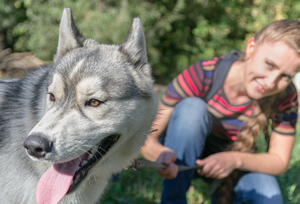
Necessary adjustments
In Karen Pryor’s original Ten Laws of Shaping she encouraged trainers to relax old criteria when they are introducing new criteria. Trainers sometimes fail to recognize new criteria, which is one of the reasons Karen adjusted the wording of her “laws” in her 2014 update, The Modern Principles of Shaping. Her revised wording suggests that trainers should relax old criteria when something changes. This might seem like a minor and insignificant change, but I think it helps young trainers recognize the need to lower criteria in a wider range of circumstances. I want to revisit this simple guideline because I find myself suggesting that trainers lower their criteria frequently.
For example
A trainer moves a dog into a new room in the house and the trainer’s expectation is that the dog should respond perfectly, even if that behavior has never been requested in that room previously. I point out that the criteria changed, something is different to the dog, and it might be helpful to lower criteria. Experienced animals will learn to generalize to new surroundings and, with experience, may be able to perform to original criteria in any setting. But when that fails to happen, I recommend listening to the dog; he is indicating to you that something is different.
A similar problem arises when an animal is expected to share his trainer with another animal for the first time. Even if both animals perform perfectly when they are alone and know each other well, if being worked as a pair is new to them, that is new criteria. Working together is a significant change from both animals’ perspectives. It should not surprise the trainer if some well-trained behaviors deteriorate under those circumstances.
Even what appear to be insignificant changes—a new plant in the corner, a new paint job on the walls, the furniture recently rearranged, working at 2:00 am for the first time, or introducing a new type of treat—can have an impact on behavior. Be forgiving when your animal indicates that he is uncomfortable with a change.
I hope these examples expand trainers understanding of “new criteria.” When previously reliable behavior starts to deteriorate, it is usually an indication that there is something different in the environment. Ideally, trainers should recognize that there is something different and be prepared to adjust criteria before things go wrong.
Happy Training,
Ken



Post new comment